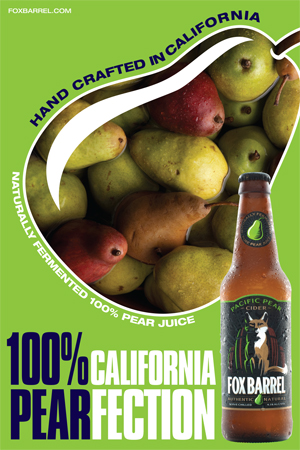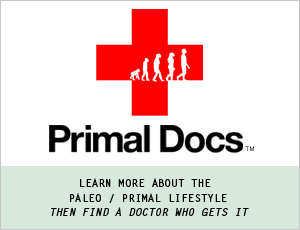 I’m really excited to have interviewed Mark Sisson, author of the hugely popular, Mark’s Daily Apple. For those of you who are not familiar with his work, he’s the author of the Primal Blueprint which essentially follows the evolutionary model of meats, fish, greens, nuts, vegetables and limited fruits. (It’s not uncommon for people with celiac disease to find their way to a primal (or paleo) diet as it is naturally gluten-free — grain-free in fact).
I’m really excited to have interviewed Mark Sisson, author of the hugely popular, Mark’s Daily Apple. For those of you who are not familiar with his work, he’s the author of the Primal Blueprint which essentially follows the evolutionary model of meats, fish, greens, nuts, vegetables and limited fruits. (It’s not uncommon for people with celiac disease to find their way to a primal (or paleo) diet as it is naturally gluten-free — grain-free in fact).
— — —
The Interview:
CH: Thank you for taking the time to chat with us. You’ve been an inspiration to a lot of people with your common sense health advice that focuses on health and well-being.
Thanks for having me. I’m always happy to talk to people who really get it, like yourself. I figure even though we all come at this health and well-being stuff from different angles, we aim for the same general target and cross paths on a regular basis, often finding ourselves meandering along the same trail.
CH: How did you get started talking about food?
MS: Food is something that we all have to deal with. I mean, we’re living things; we require sustenance. It always made intuitive sense that what we eat has the biggest impact on our health. We don’t eat, we die. We eat too much of one thing, we get a stomach ache. We eat the wrong stuff, we get fat. We eat the right stuff and combine it with smart training, we get fit and strong. Food obviously has an effect on how we feel on a day to day basis, and so making the connection between food and most every other serious malady – from cancer, to heart disease, obesity, and diabetes, to name a few – was simply the next logical step.
I’m not sure if you know this about me, but I used to be a world-class endurance athlete. Marathons, and later triathlons, were my forte. I was a fit guy, and anyone who saw me and learned that I was a marathoner would assume I was incredibly healthy, but I was sick all the time, had arthritis, irritable bowel syndrome, and worn down. Once I realized the food I ate to fuel my insatiable chronic cardio habit wasn’t doing me any favors, I took a deeper look at what I had assumed to be my healthy diet. The rest is history.
CH: Why Primal?
MS: Evolution is the foundation of biology. Without viewing things through the prism of evolution, any conclusions you have about health, physiology, and nutrition are incomplete or even wrong. Looking at modern health and diet science through the lens of human evolution, you find that the stuff matches up really well. Each of us have inside us a collection of genes that “expect” a certain type of environment; environment includes diet, sleep, stress, physical activity, and sun. Genes express themselves differently in response to environmental input. If you’re spending all your time indoors in front of the computer or television, eating strange food that’s only been around for a few generations, staying up late and immersing yourself in a perpetual bath of artificial light, you’re sending your Primal genes the wrong message. They don’t know what to make of it. That’s when things go wrong, and going Primal is the attempt to send your genes the right environmental messages – the message they understand and expect.
CH: What’s the difference between Primal and Paleo?
MS: Primal is the kinder, gentler Paleo. I want to reach as many people as I can (let’s face it, there are a lot of sick, overweight, confused people out there who need our help) by making this stuff as user-friendly as possible. I’m not going to say you have to give up chocolate for life, especially when modern science recognizes that the polyphenols in cacao are beneficial. Just eat 85% cacao dark chocolate as a treat instead of poor quality milk chocolate. I’m not going to tell you to give up butter because it’s dairy. Butter has an undeniably positive fatty acid composition that works well with our physiology. Just because it wasn’t eaten 20,000 years ago doesn’t mean it’s not worth eating today.
Primal acknowledges the reality of our ancestral genes while using the tools of modern life to satisfy those old genes. We pick and choose from both to arrive at the most advantageous position possible. Go to the doctor to fix something but ignore what he says about red meat.
CH: How could a Primal diet benefit someone with celiac disease?
MS: The foundation of the Primal eating plan is the avoidance of grains, especially gluten-containing grains like wheat, rye, and barley. What Primal does is acknowledge that even non-celiacs probably have some measure of gluten sensitivity, and I think it follows that celiacs would improve their lives even more by removing other evolutionarily novel foods that might be damaging their health.
CH: What are your thoughts on the huge gluten-free market that has evolved over the past several years?
MS: It’s a step in the right direction, because it acknowledges that gluten is a very real problem, but the move toward more processed food is too lateral for me. Processed junk without gluten is still processed junk. Still, it indicates that people are aware of gluten, and if they’re willing to give up wheat, I bet the other bad stuff isn’t too much of a leap.
CH: What advice would you give to a newly diagnosed celiac?
MS: Go the extra mile and give up grains, legumes, refined sugar, and processed seed oils along with wheat. You’re already going to be “limiting” a staple food that you probably assumed was going to be in your diet for life; why not give the others a shot, too, to see how you feel?
CH: What are your top 5 favorite sources of information on the Internet for food and nutrition?
MS: Hyperlipid: Petro Dobromylskyj is the mad fat scientist, a vet with a physiology degree and a nose for research. You may want to read his posts twice just to get everything.
Whole Health Source: Stephan Guyenet is a brilliant researcher. Not Primal or Paleo, but he provides excellent, unbiased analysis.
Paleohacks: Ask food related questions and get dozens of answers from dedicated (some might say obsessed) users. Totally worth exploring.
Free the Animal: Richard Nikoley is a friend of mine. He’s no nutritionist, but doesn’t profess to be. His food porn and no-nonsense approach to diet and health make him worth adding to your blogroll, though.
USDA National Nutrient Database: It’s got comprehensive stats for almost every food.
CH: Do you have a favorite meal or recipe?
MS: A perfectly seared medium-rare grass-fed ribeye with a side of green veggies (broccoli, asparagus, spinach, etc) cooked in butter. I like complex flavors, but I always return to the simple meals made with quality ingredients.
CH: Any parting words?
MS: Thanks for having me! You’ve got a great thing going here and I think, together, we can change the way we approach health and wellness.
— — —
 If you’re interested in purchasing Mark’s book, The Primal Blueprint,
If you’re interested in purchasing Mark’s book, The Primal Blueprint,
click here for ordering information.






